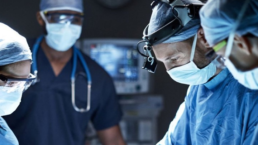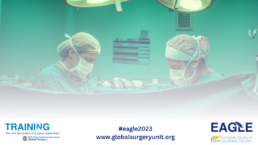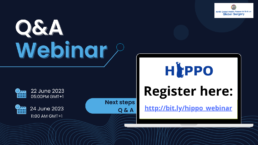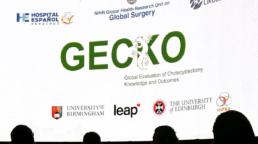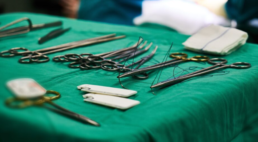Checklist Developed by the GSU could Help Surgical Teams Prepare for Summer Pressures
Checklist developed using data from GreenSurg Collaborative led survey could help surgical teams in low- and middle-income countries to prepare for issues relating to global warming.
The “Operating Theatre Heatwaves Checklist” has been developed by researchers to summarise four key points that should be taken into account by clinical operation based teams when looking at the development of strategies to reduce any issues arising from prolonged periods of abnormally hot weather. The team were able to analyse data from 20 specialities across 140 UK hospitals that operated during the UK heatwave of July 2022.
From the data that was analysed during the study, the checklist asks the following questions which should be taken into account when looking to reduce the impact from prolonged periods of excessive heat:
- Do you have an operating theatre heatwave plan?
- Can your operating theatres function during heatwaves?
- Do you have a plan in the case of staff shortages?
- Is there a heatwave-related surge in emergency admissions – can surgical activity be maintained?
Members of the research team were able to present the checklist at the Faculty of Public Health Climate and Health Conference, taking place on the 21st June with a focus on the subject of “Adapting to a warming world from the UK perspective”, attended by a multitude of of professionals from the food systems, built environment and healthcare international industries.
The United Nations defines Climate Change as long-term shifts in temperatures and weather patterns that have been primarily driven by human activities, particularly since the 1800s. As climate change intensifies, the ramifications of raising temperatures (one of the effects of elevated greenhouse gas emissions derived from the burning of fossil fuels) will have a direct impact on us all, with the global healthcare sector being particularly prone to issues arising from increasing global temperatures.
You can view the full checklist by clicking here.
You can also view the original GreenSurg publication Elective surgical services need to start planning for summer pressures, published in April 2023 by clicking here.
Education and Training Webinar: EAGLE Study Video Available Online
You can now view the video from the online webinar that took place on Monday 5th June on the NIHR Global Health Research Unit on Global Surgery (GSU) Youtube channel
Anastomotic leak is a severe, potentially life-threatening complication following right colectomy. Internationally, anastomotic leak occurs after 8% of right colectomies. Prospective cohort data demonstrate that patient selection, intraoperative factors, and technical variation are risk factors for anastomotic leak. EAGLE was an international quality improvement programme to share best practice and harmonise procedures for surgeons and the theatre teams so that they might perform the best possible anastomosis for each particular patient. The study was carried out by 350+ hospitals across more than 60 countries.
The online webinar video chaired by Prof. Dion Morton provides all those working in surgical practice and research with an overview of the ground breaking global study EAGLE which is due to be published soon. The hour long video includes the following highlights:
- Study background – ESCP RH Audit
- Panel Discussion – Why is a Study Required?
- EAGLE Study Design
- EAGLE High Level Results
- Breakout Room – Introduction to Research Methodology
- Panel Discussion – Could the QI Intervention be Implemented in Practice?
- Future Directions
You can view the video by clicking here.
More information on EAGLE can be viewed by clicking here with further information on the Education and Training Programme viewable by clicking here.
HIPPO Webinar: Next Steps of the Study Discussed
HIPPO webinar will provide an opportunity for study participants to have questions answered, in addition to a discussion on the next steps of the study
When is it?: Thursday 22nd June – 5PM UK BST
Saturday 24th June – 11AM UK BST
Following on from the data collection window ending on the 21st May, the HIPPO study team will be hosting the next in their series of the online Q&A events. The webinar will also feature a discussion on the next steps of the study that will feature information on the completion of the authorship form and centre survey, with a further discussion on data checking also taking place.
The HIPPO Steering Committee will be hosting the event that will be attending by a range of clinicians and allied healthcare professionals from 81 countries globally.
You can register for the event by clicking here.
For more information on the HIPPO study, click here.
GECKO Study Promoted at the Mexican Association of Endoscopic Surgery Receives Positive Feedback
Mexico Hub Director discusses GECKO study at XXXI Endoscopic Surgery International Conference by the Mexican Association of Endoscopic Surgery (Asociación Mexicana de Cirugía Endoscópica – AMCE) in Mexico
Mexico Hub Director, Dr Antonio Ramos-De la Medina took part in the national conference, held in Acapulco, Guerrero, Mexico on May 5th where he was able to provide an update on various GSU workstreams to the audience in attendance. During his time on stage, Dr. Ramos-De la Medina presented on the results from the completed FALCON and CHEETAH trials, in addition to providing an overview of the GECKO study that has to date seen 1200 across the globe sign-up to take part.
Feedback following the presentation at the national event, attended by a multitude of clinicians and allied health professionals from across Mexico was positive with Mexico Hub Manager, Dr Laura Martinez Pérez Maldonado mentioning that the presentation and promotion of GECKO received many positive comments as well as generating great interest in the study.
The GECKO study will evaluate global variation and outcomes for cholecystectomy (surgical operation involving the removal of the gallbladder) which is one of the most common surgical operations carried out globally.
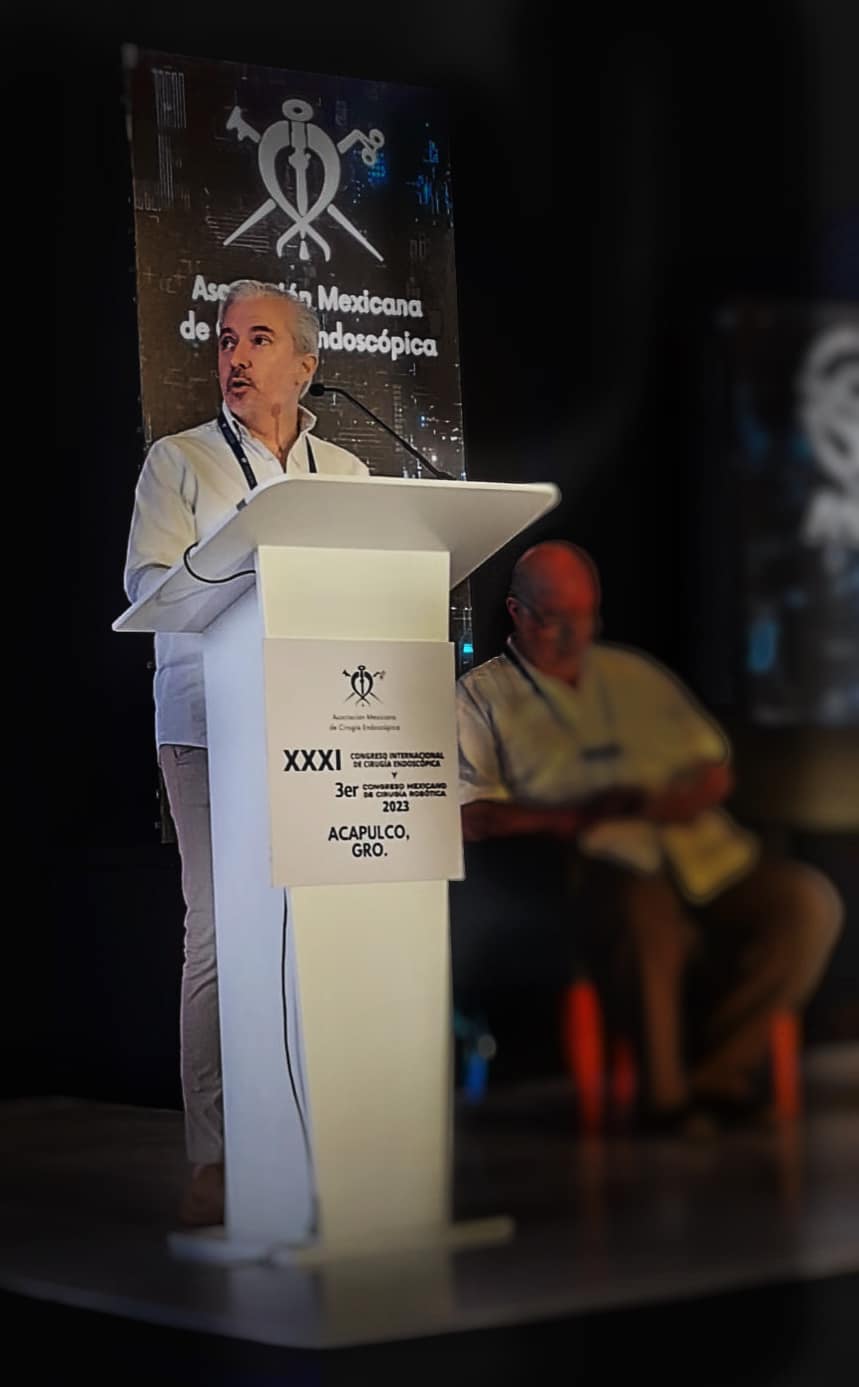
You can find out more on the recently launched GECKO study by clicking here.
More information on the the Mexico Hub can be found by clicking here.
Latest Publication Asks Surgeons to Look Beyond the Operating Theatre to Save Lives Globally
Experts from the NIHR Global Health Research Unit on Global Surgery (GSU) propose three priority areas for surgery in publication for The Lancet
The Lancet Commission on Global Surgery, originally published in 2015 focused on lessening the healthcare based disparities faced by populations around the globe through the provision of high-quality surgical and anaesthesia care with financial protection when needed. The publication’s purpose was to achieve this vision through highlighting the importance of embedding of surgery within the global health agenda, galvanising political change, and defining scalable solutions for provision of quality surgical and anaesthesia care for all.
The publication in The Lancet from the GSU Collaborative have identified three key areas that have the most potential to reduce major causes of death and improve surgical access of care to all:
- Access, equity, and public health must be recognised as crucial issues for surgery – surgery has a key role in addressing global health challenges such as trauma, congenital anomalies, safe childbirth, and non-communicable diseases
- Inclusion and diversity must improve in both surgical research and the profession – advancing inclusion and diversity will ensure a research agenda that delivers a pragmatic and appropriate research reflecting the needs of all
- Climate change is the greatest global health threat facing the world – moving towards net-zero operating practices would reduce carbon emissions and enable surgeons/ policy makers to reassess the role of surgery within healthcare
The publication argues that despite the problems of large waiting lists and economic squeezes on health systems, focusing on these three key areas will ensure that surgical care can become a fundamental element of universal healthcare provision for all that will ultimately deliver major improvements in population health across the globe.
You can read more on the recently published article Surgical research – comic opera no more by clicking here.
You can also read further information on the publication in the University of Birmingham press release by clicking here.
Education and Training Webinar: EAGLE safe-anastomosis study
New webinar will look at the results from the recently completed EAGLE study
When is it?: Monday the 5th of June 2023 – 11:00 & 18:00 (GMT) – A 1hr webinar repeated twice during the day.
Who should attend?: Surgeons, surgical researchers, surgical nurses, scrub techs, ODPs and allied healthcare professionals
Hosted by: NIHR Global Health Research Unit Hashtag: #eagle2023
Anastomotic leak is a severe, potentially life-threatening complication following right colectomy. Internationally, anastomotic leak occurs after 8% of right colectomies. Prospective cohort data demonstrate that patient selection, intraoperative factors, and technical variation are risk factors for anastomotic leak. EAGLE was an international quality improvement programme to share best practice and harmonise procedures for surgeons and the theatre teams so that they might perform the best possible anastomosis for each particular patient. The study was carried out by 350+ hospitals across more than 60 countries.
This online webinar chaired by Prof. Dion Morton will provide all those working in surgical practice and research with an overview of the ground breaking global study EAGLE which is due to be published soon.
The main session will include three key presentations on (1) background and impact of anastomotic leak, (2) the design of the EAGLE study and (3) the headline results of the EAGLE study.
The format of the event includes a panel presentation of global experts discussing how the research was conducted, what the results showed, and the potential impact on surgical practice. There will be breakout sessions looking specifically at 2 key perspectives on the research (1) research methodology and results and (2) process evaluation. The webinar will conclude with a round table discussion of global experts discussing how these results can be implemented across the globe.
Register now to attend this ground breaking event
Register for the 11:00AM (UK BST) session using this form.
Or the 6:00PM (UK BST) session using this form.
You can also view Professor Dion Morton deliver a short promotional overview of the upcoming webinar by clicking here.
For instructions on how to use the Zoom meeting portal, desktop/ PC users click here for more information and iPhone/ Android users click here for further info.
NIHR Global Health Research Unit on Global Surgery (GSU) Attends 76th World Health Assembly in Geneva
Attendance at The Global Surgery Foundation (GSF) event enabled the GSU to identify pathways for Unit research to impact on global health policy
The event that took place in Geneva, Switzerland on the 23rd May was attended by GSU colleagues from the University of Birmingham who were able to join peers within the arena of surgical care at the GSF side event. The side event at the GSF 76th World Health Assembly looked at 'Strengthening Health Systems through upscaling Surgical Care' with participation from a multitude of countries including Croatia, Ecuador, Japan, Malaysia, Sierra Leone and Sweden.
The event provided colleagues from the GSU the opportunity to gain valuable insight into the current landscape of implementing surgical care systems on a global scale whilst also enabling the team to discuss pathways for the Unit to have completed research impact on international healthcare policy. The event hosted by The GSF, along with several co-sponsoring member states, also looked at the role of sustainable financing which is currently seen as a key topic within the delivery of surgical care, particularly in low- and middle-income countries.
You can find out more on how the NIHR GSU is improving global surgical outcomes through collaborative research by clicking here.
Community Engagement and Involvement (CEI) Event in Walipur, Punjab Educates Locals on Wound Management
First educational session held by GSU India Hub for local villagers provided valuable insight into wound control
The event that took place on the 15th May in Walipur, Ayali Kalan, Punjab was part of the India Hub's rollout strategy in engaging rural networks across the country, using evidence generated from across the Unit's portfolio of international trials and studies that included patients from across India.
The audience consisted of predominantly patients and Community Health Workers (non-medically trained frontline health workers who are often the primary point of contact for patient care in India). The discussion focused on the management of a variety of wounds and how they can be treated within a domestic setting using basic tools.
The success of the event resulted in nearby village heads requesting the session to be delivered to their local populations, in addition to the creation a variety of take-home materials that the India Hub team are currently working on. The India team are also planning on providing a Cancer Engagement session next month that will look to take place as part of the team's CEI event rollout strategy for local populations across India.
You can view more information on CEI by clicking here.
You can also view the India Hub page by clicking here.
Paper Highlights Link between Investing in Safe Surgery and Reduced Burden on Healthcare Infrastructure in LMICs
A paper from the KIWI study demonstrates how investing in health technologies may help reduce the costs associated with Surgical Site Infections (SSIs) for both the patient and low-resource health systems
The Key resource use In Wound Infection (KIWI) study was carried out to estimate the cost burden associated with SSI. The specific objectives of KIWI were to:
- Measure the additional within-hospital resource use for patients with SSI compared to patients without SSI
- Identify and measure the resource use for patients who have SSI detected after hospital discharge
- Explore the relative cost burden for patients with contaminated-dirty operations compared to patients with clean-contaminated surgeries
- Explore the healthcare needs and resource use of patients with an unresolved SSI at 30 days and beyond
A total of 335 patients were included in the global study with data collected on postoperative resource use and costs from consecutive patients undergoing abdominal surgery with an incision >5cm (including caesarean section) that were recruited to the FALCON trial between April and October 2020. A mix of both prospective and retrospective data was used which recorded SSI occurrence in 7% of clean-contaminated cases and 27% of contaminated-dirty cases.
Using data from inpatients in India, Mexico, Ghana and Nigeria, researchers were able to conclude that SSI was associated with an increase in postoperative healthcare costs by 75.3% (€412) after clean-contaminated surgery and 66.6% (€331) after contaminated-dirty surgery. The overall mean additional post-operative costs with SSI were higher in clean-contaminated cases compared with contaminated-dirty cases. This led researchers to conclude that investment in health technologies to reduce SSI may mitigate the financial burden to patients and low-resource health systems.
The findings have been published in Journal of Hospital Infection which you can access by clicking here.
You can read the full UoB press release by clicking here.
You can also access additional information on the projects involved by clicking here for KIWI and here for FALCON.
Benin Hub Data Provides Valuable Evidence for Detection of Surgical Site Infections
TALON data enables student from the Faculty of Health Sciences of Cotonou to establish link between detection in Surgical Site Infections (SSIs) and telephone calls made to patients
The link was made in the student's doctoral thesis that looked at the diagnosis of infections of the operating site in abdominal surgery in 3 hospital centres in Benin. Thesis results showed that out of 103 patients surveyed from the 3 hospital sites, just under 8% had an SSI diagnosis made via telephone consultation. This compared to just under 9% receiving a diagnosis from a face-to-face examination.
This is the first time in which the Benin Hub have provided data to enable a student from a partner organisation to conduct their research. The team are hoping that they'll be able to assist more students with data generated through GSU based work and also stated how this relationship demonstrates the impact the hub is having on local healthcare and research based infrastructure.
You can view more on the Benin Hub team by clicking here.
You can also find out more on the TALON Study by clicking here.

